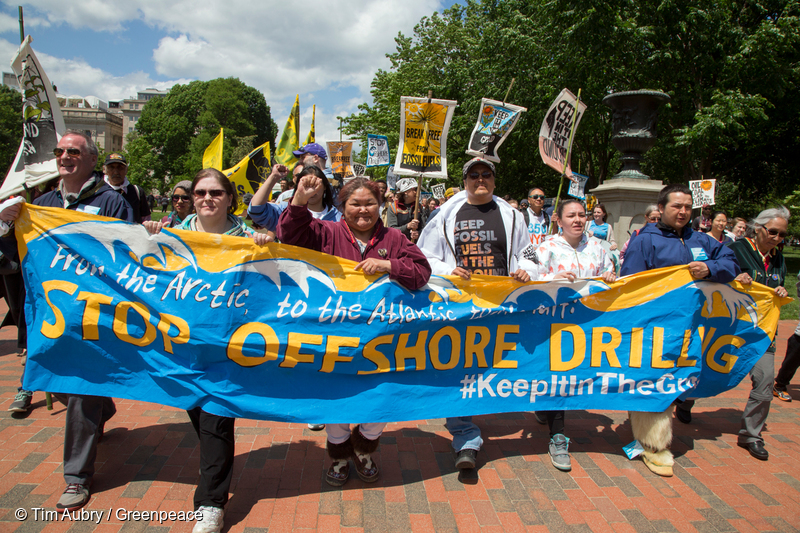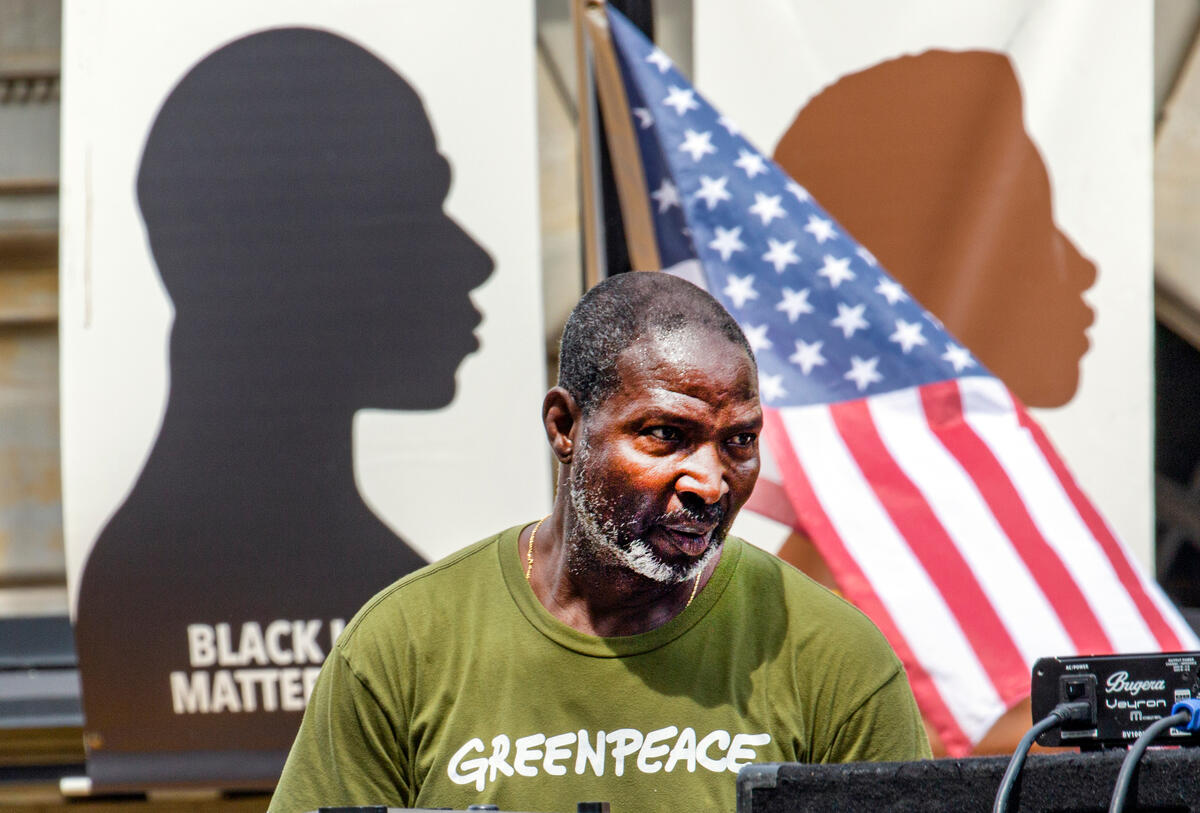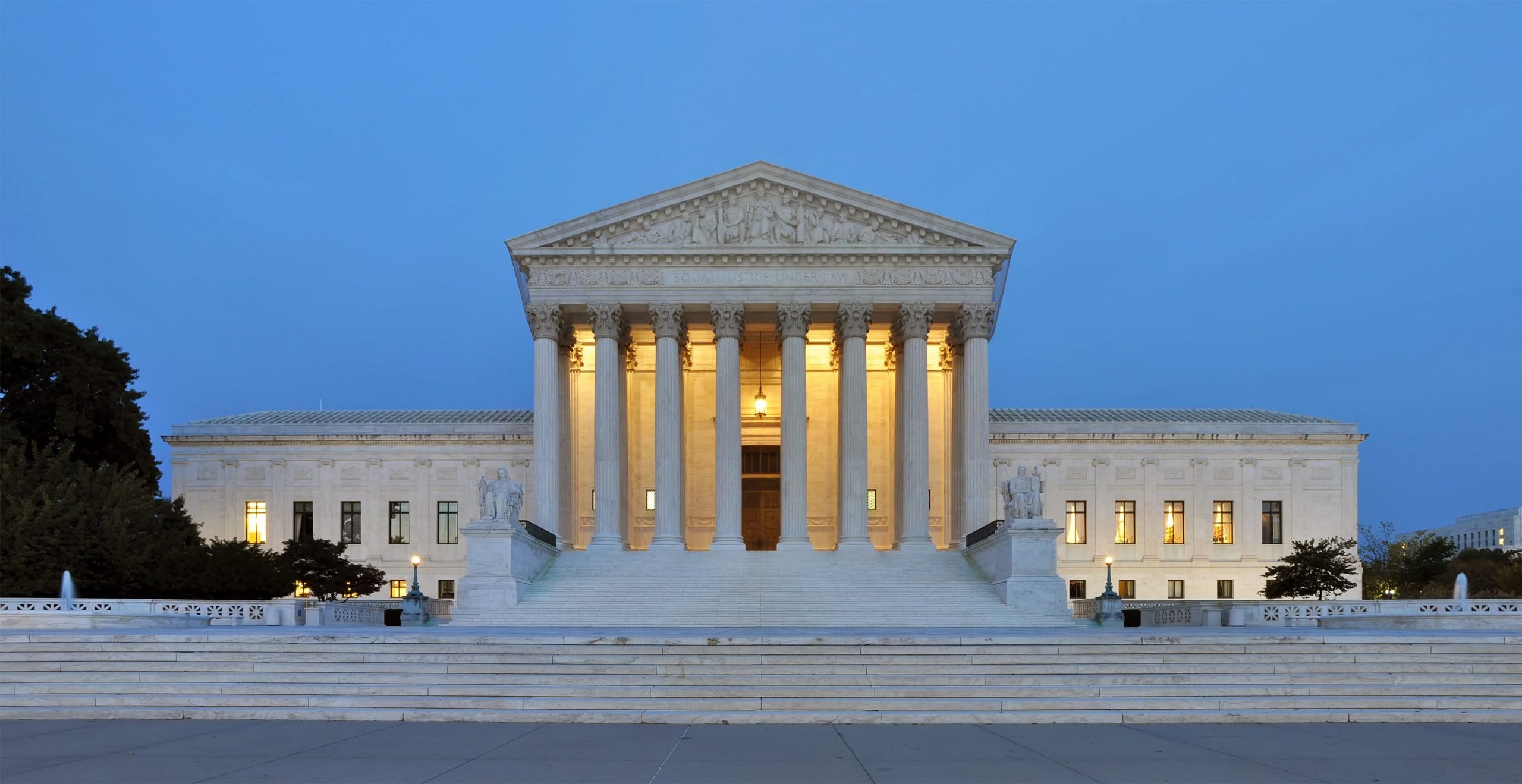Project 2025’s pro-fossil fuel policies could increase U.S. carbon emissions, undermine climate action, and threaten environmental progress, including international commitments.

We come together from across the United States to strengthen our movement and demonstrate our power and resistance at the gates of the White House. We bring our solutions to the climate crisis, the problems that affect our communities and the threats to peace to our leaders in Congress to demand action.
The Heritage Foundation’s 900+ page Mandate for Leadership 2025, known as Project 2025, is a detailed transition plan for the next conservative president. The proposal was written and supported by over 100 organizations and funded by Wall Street billionaires and far right think tanks, many with close ties to former president Donald Trump. Many of the organizations that contributed to or supported the document are funded by the fossil fuel industry, including the American Legislative Exchange Council.
Although he tried to distance himself from it, Trump has made it clear that he supports many of the broad political changes and specific policies proposed by the Project. To publicly detach his campaign from the Project, he supported the America First Agenda (AFA). He also called on the authoring organization, the far-right American First Policy Institute (AFPI), to lead his transition team in 2025. AFPI is an organization formed by many former senior advisors from the Trump administration. While the AFA is significantly less detailed on specific policy changes, it echoes the same far-right sentiments expressed in Project 2025.
Meet the Heritage Foundation’s Project 2025
Project 2025 is an authoritarian blueprint to restructure the government and expand presidential power. The Project outlines a vision that would destroy the essential limits on presidential power of the federal government, putting our basic freedoms at risk. The proposal would lead to massive reversals of climate protections, rollbacks on environmental protections, and potentially limit the freedoms of assembly and speech. The chilling agenda details the policy changes a second Trump administration could take to bring many authoritarian ideals into reality.
In the Greenpeace movement, we fight for a just world and work to transform the social, environmental, and economic systems that threaten the climate and democracy. We have dedicated our work to protect the world’s oceans, fight against the climate crisis, challenge racist and inequitable systems, and protect basic freedoms of a safe, livable world. In partnership with many allies, we have helped safeguard ecosystems, protect communities from toxic pollution, and advocated for the rights of the people against corporations and extremist politicians. Project 2025 threatens to unravel many essential safeguards for the environment and exacerbate dangerous threats to democratic freedoms.
Threats to Climate and the Environment
Project 2025 takes direct aim at climate policies and environmental protections, and consistently distorts climate change as a “political agenda” perpetuated by the left, rather than as a well-documented reality based on overwhelming scientific evidence. The implementation of pro-fossil fuel policies recommended by Project 2025 and echoed by the Trump campaign could add at least an additional 4 billion tonnes of carbon to U.S. emissions by 2030 just by rolling back on Biden’s climate progress. These proposals would significantly impede U.S. efforts to mitigate climate change and meet international commitments like those posed in the Paris Climate Agreement. It would also threaten much of the progress Greenpeace USA and our allies have made to protect our environment over the last 53 years:
Air and Water Pollution
- Undermine the authority of the EPA to regulate dangerous air and water pollutants by changing standards, reducing the scope of authority, and rolling back the standards of Clean Air Act and Clean Water Act.
- Remove the Once-In, Always-In position of the Clean Air Act so that major pollution sources can be deregulated once they meet an emissions threshold.
- Make the Superfund program more lenient and deregulated, including revising regulations to be less strict on dangerous PFAS (also known as “forever chemicals”) and delisting PFAS as a “hazardous substance”.
Protecting Federal Land
- Reinstate Trump orders that support oil and gas exploration and development, timber harvesting, and mining, including in Alaska and western federal lands.
- Reduce the number and size of national monuments, such as the Cascade–Siskiyou National Monument to open the area for timber harvesting. The Project also recommends repealing the Antiquities Act of 1906.
- Reestablish the Trump administration’s NEPA reforms, including limiting public review, eliminating cumulative impact analyses, and allowing environmental impact statements to be completed by project proponents.
- Weaken the Endangered Species Act including reducing oversight and authority and delisting species like the grey wolf and the grizzly bear.
Climate Protections
- Restructure the U.S. Global Change Research Program (USGCRP) and related climate change research programs throughout the federal government to eliminate climate research and climate considerations in decision making and enforcement.
- Repeal major climate legislation, including the Infrastructure Investment and Jobs Act and the Inflation Reduction Act, and remove the climate portions of the CHIPS and Science Act.
- Limit the Greenhouse Gas Reporting Program to the few sectors that are currently regulated (such as power plants, oil and gas production) and excuse other major emitters (like iron, steel, cement, CCS, and landfills). This could also gut the EPA’s GHG Inventory.
- Ensure that EPA work more aggressively relies on “consistent and transparent consideration of costs”. The EPA’s Reagan-era cost-benefit analysis consistently weakens environmental regulations, as costs are quantifiable but benefits tend to be diffuse and hard to quantify, even if they are much larger in aggregate.
- Eliminate the Interagency Working Group on the Social Cost of Carbon.
- “Update” the 2009 EPA endangerment finding that states GHGs harm public health and that the Clean Air Act can be used to fight climate change.
- Withdraw from the United Nations Framework Convention on Climate Change and Paris Climate Agreement (again).
- Eliminate or redirect DOE commissions that progress renewable energy or climate mitigation, such as eliminating the Office of Energy Efficiency and Renewable Energy, redirecting the Grid Deployment Office to halt grid planning efforts and considerations for renewable energy providers, and even eliminating energy efficiency standards for appliances.
Fossil Fuel Infrastructure
- Maximize offshore oil and gas lease sales in the 2023-2028 leasing period, and eliminate 5 year plans in exchange for rolling or quarterly lease sales.
- Reinstate executive and secretarial orders that prioritize and expand fossil fuel extraction and offshore drilling.
- End the pause on LNG export authorizations, accelerate approvals for new LNG infrastructure, and exclude LNG terminals from NEPA review.
- Direct FERC to support natural gas infrastructure expansion and reduce efforts to develop renewables or non-carbon emitting resources in favor of coal, nuclear, and natural gas.
- Restrict NEPA analyses of natural gas pipelines to consider only “the impacts of the actual pipeline itself, not indirect upstream and downstream effects” and similarly limit Natural Gas Act authority and shift to focus on providing access to natural gas.
- Neither DOE nor FERC would be authorized to use climate change as a reason to stop or deny LNG projects.

Break Free Supporters Speaking Out Against Off-shore Drilling in Washington, DC in 2016. © Tim Aubry / Greenpeace
The Arctic
- Strip DOI protections for the Arctic National Wildlife Refuge and reinstate the 2020 Environmental Impact Statement in order to reopen the refuge for oil and gas exploration.
- Expand the Willow oil project in the National Petroleum Reserve of Alaska.
- Reopen Tongass National Forest for logging and road development (reinstated from the Trump administration).
- Open most of the National Petroleum Reserve of Alaska for development and lease sales (reinstated from Trump administration)
Oceans
- Withdraw the 30×30 Executive Order and the America the Beautiful Initiative which protect critical marine ecosystems and weaken safeguards like the Marine Mammal Protection Act, Endangered Species Act, and the National Marine Sanctuaries Act for the potential benefit for the fishing industry. Current national marine sanctuaries would be re-examined for oil, gas, and mineral exploration.
- NOAA services in environmental data, environmental stewardship, and applied scientific research would be commercialized and scope would be greatly diminished, especially any climate change research efforts. This would also mean privatizing essential weather and storm alerts for ordinary people.
Nuclear
- Amend the Nuclear Waste Policy Act to reduce federal responsibility for nuclear waste and advocates for nuclear testing and nuclear waste disposal from nuclear energy plants at Yucca Mountain in Nevada.
- Expedite Nuclear Regulatory Commission nuclear reactor licensing, eliminate the ALARA (“as low as reasonably achievable”) standard for radiation exposure, and reduce the scope of NEPA analyses.
Threats to Democracy
The Trump campaign, his America First Policy Institute-led transition team, and Project 2025 have all called for an expansion of executive power that could be abused in a future Trump administration. Project 2025 recommends the president use the Department of Justice as it aligns with the presidential agenda, and Trump has supported this for years. Under Project 2025, the president would have ultimate authority to direct how the Department of Justice makes decisions on prosecuting and investigating, and this would have direct impacts on state and local jurisdictions.
Trump has already used federal agents, surveillance, and even the National Guard against protestors and journalists. He has continually called on federal prosecutors and the FBI to investigate his opponents. His “tough on crime” approach has carried over into campaign promises to attack online free speech and support for violent crackdowns of protests. Many of our efforts to protect the rights of workers and communities against corporations, climate threats, and extremism are threatened by the radical, authoritarian proposal:
Labor and Worker Protections
- Give corporations more control over employee wages, prevents union formation and employee organizing, weakens child labor laws, restricts overtime pay, and makes it easier for companies to discriminate.
- Pass the Teamwork for Employees and Managers Act which greatly weakens union power allocated by the National Labor Relations Act.
Freedom of Speech and Assembly
- Weaponize the Department of Justice so the federal prosecutors could be used to seek legal retribution against opponents, or investigate politicians, reporters, activists, academics, and individuals or groups the President disfavors.
- Implement the Schedule F civil service category, leading to a partisan federal civil service that is loyal to the presidential agenda, and stripping away essential labor protections for civil servants.
Elections
- The Project calls for changes in election administration that would endanger election security and prevent federal agents and tech companies from preventing the spread of dis- and misinformation.
- Project 2025 leaders have now begun to manufacture false evidence of voter fraud in anticipation of the 2024 presidential election.

Activists with Greenpeace USA join the picket line led by United Steelworkers (USW) Local 5 union members in San Francisco Bay in front of the Sea Hope on the Chevron dock. © Nick Otto / Greenpeace
Project 2025 represents a significant threat to climate action and the environment, and could erode basic democratic freedoms. Implementation of the Project’s policy recommendations would dismantle critical environmental protections and reverse hard-won progress on climate. It also details an authoritarian vision that would undermine democratic freedoms, restrict voting rights, and concentrate power in the executive branch in ways that could be abused. Our next President will impact our future in really important ways. Show up and vote for the future you believe in.



